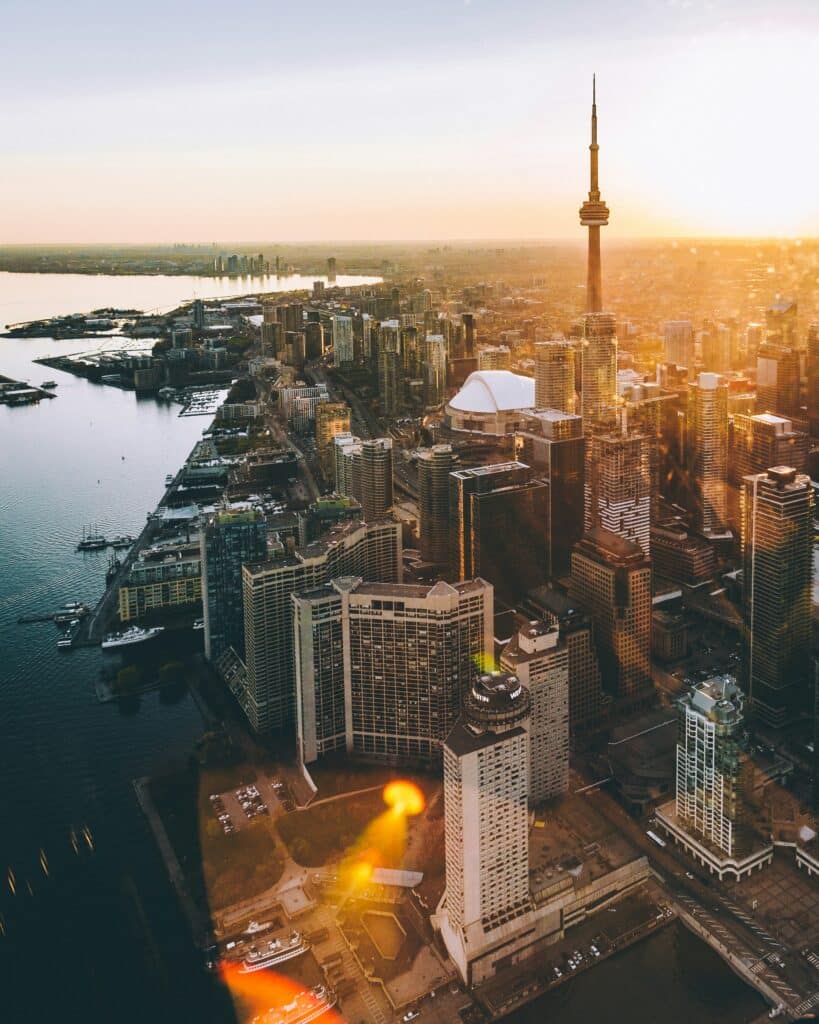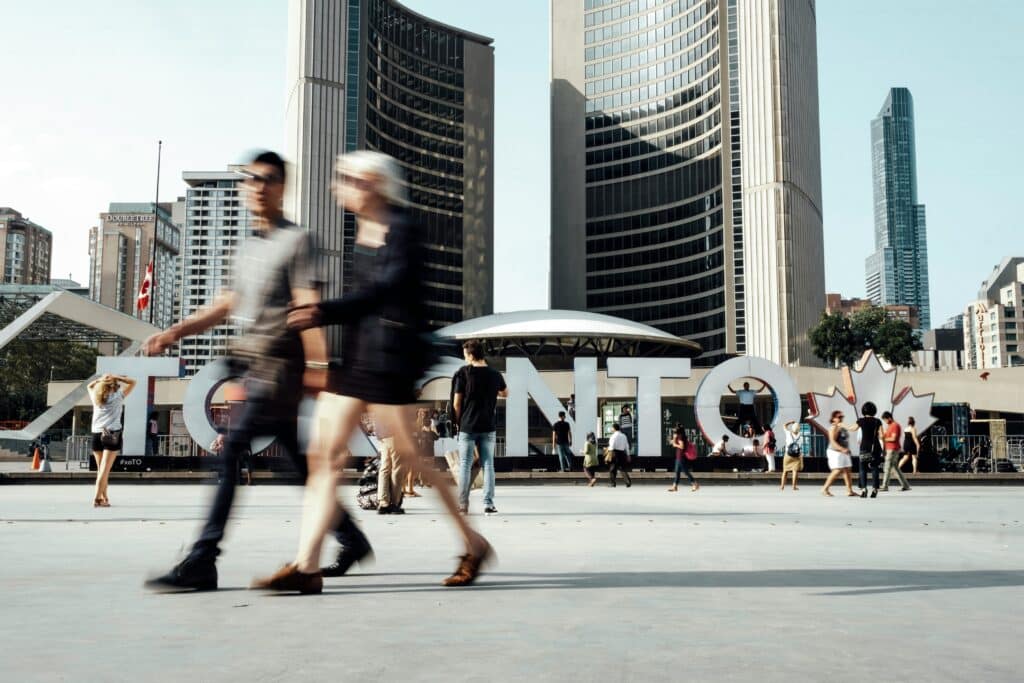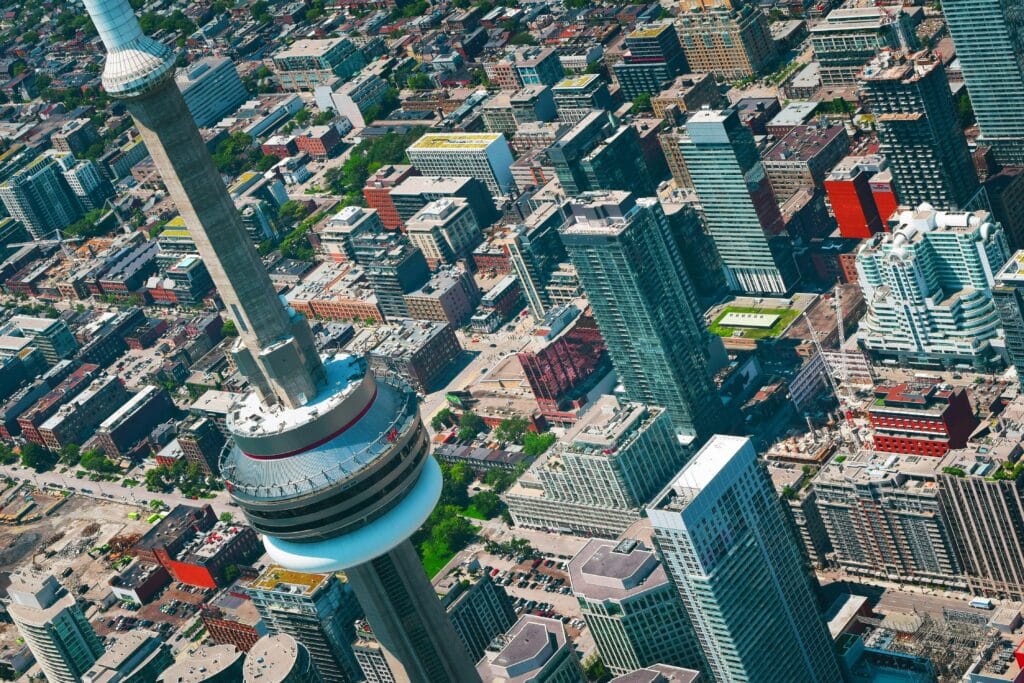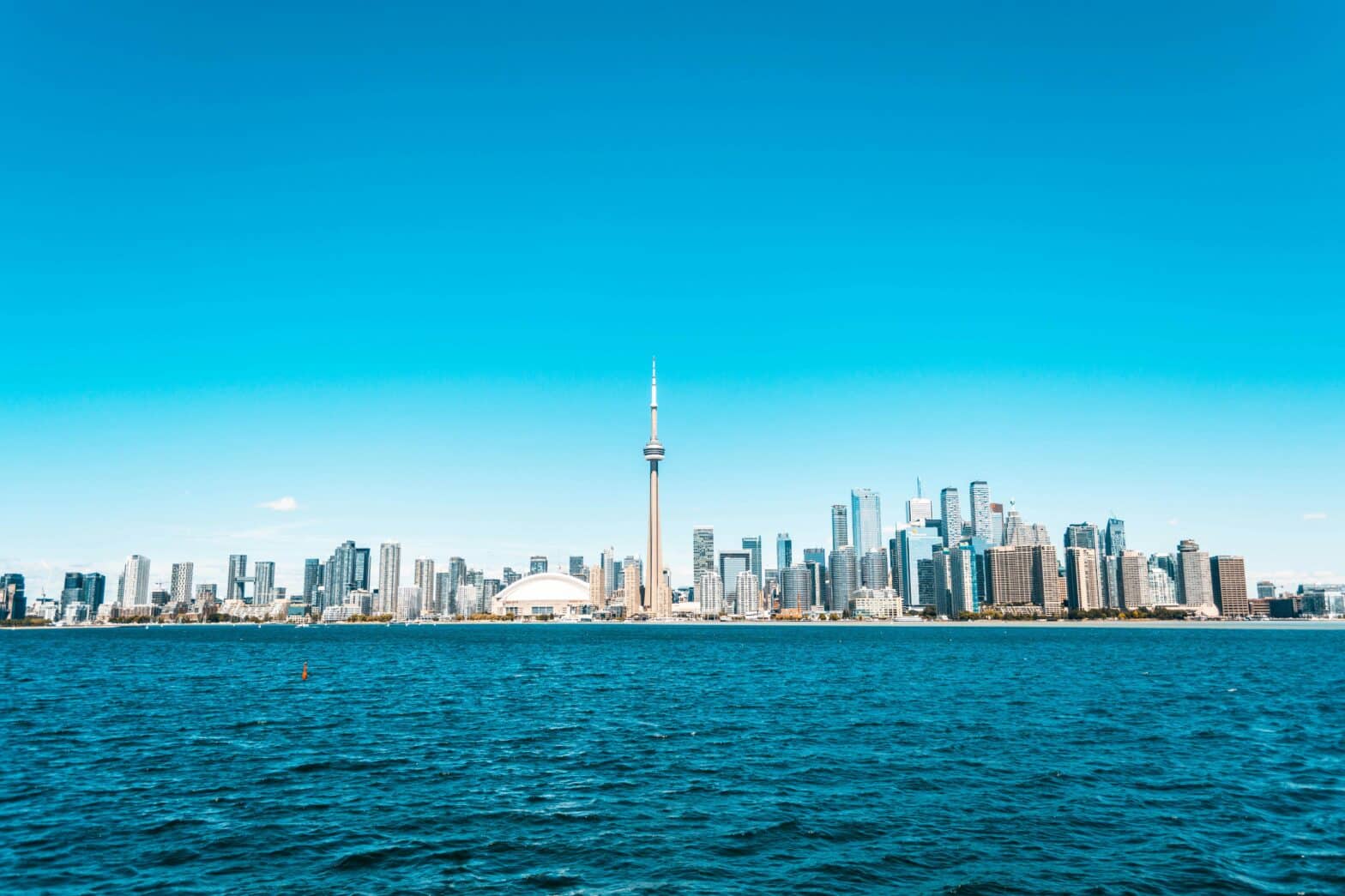This exuberant metropolis is the country’s international financial, economic, cultural and technological centre. More than 160 languages are spoken In Toronto, the capital of the Canadian province of Ontario. Almost half the city’s residents were born outside the country. These figures perfectly embody the official motto of this multicultural city — ‘Diversity is our Strength’. For these reasons and more it’s no coincidence that Toronto continues to attract people from all over the world:
Foyer Global Health offers you an overview of what to expect during your stay in one of the world’s most cosmopolitan cities.
Toronto has it all:
- Excellent career opportunities in a wide range of sectors from film to finance; pharmaceuticals to IT.
- A wealth of cultural and artistic attractions
- Toronto is one of the safest cities in North America
- Extraordinary cuisine
- An efficient transportation system
- A wide range of excellent schools
- A range of activities to do solo,, as a couple or as a family
… In short, an excellent quality of life for anyone considering moving to Canada!

Accommodation in Toronto
Where to live?
Toronto may look a bit like New York, with its skyscrapers such as the CN Tower. At the same time, the city is home to living spaces of all types and sizes to suit all profiles and budgets. From luxury condos in tall towers to charming Victorian townhouses and spacious lofts; you’ll be spoilt for choice!
Leases are generally for 12 months, and the deposit is often equivalent to 1-2 months’ rent. In addition to the rent, tenants are required to pay for gas and/or electricity. By law in Ontario, all tenants are required to take out tenant’s insurance.
Finding your perfect space
Before you find your new home, it’s a good idea to take a temporary place to stay (B&B or Airbnb) so you can explore the city and find the neighbourhood and type of accommodation that suits you best.
You can browse property lilstings on websites such as Kijiji, Craigslist, Rent Board or PadMapper, contact estate agents such as Toronto Rentals or join specialist Facebook groups.
Toronto’s districts
Toronto may be a huge metropolis (it covers about 630 km2!), but its many different neighbourhoods, some peaceful, some lively, give it a village feel.
- The Annex: is located next to the University of Toronto. This neighbourhood is popular with students and young creatives alike for its vibrant, bohemian atmosphere, where cute cafes rub shoulders with old Victorian mansions. All with easy access to public transport and parks!
- Forest Hill is home to some very exclusive mansions and prestigious public schools.
- Liberty Village Is a former industrial neighbourhood. This residential area is popular with urban souls and ambitious young professionals. Many digital and technology start-ups have set up here.
- West Queen West is a very trendy area where urban art and design rule. According to Vogue. It’s renowned for being the second coolest neighbourhood in the world!
- Yorkville is the place for wealthy expats who love glamour, high-end living and gourmet restaurants. This former hippie neighbourhood is home to skyscrapers, gorgeous (and expensive) Victorian houses and chic boutiques.
- Kensington Market:This neighbourhood symbolises the city’s immense cultural diversity. In the Market you’ll find vintage clothes shops, lively cafes, churches and fusion restaurants of all kinds.
- Rosedale is a quiet, exclusive, upscale area of the city with some beautiful homes.
- Cabbagetown is a historic Toronto neighbourhood named after the Irish immigrants who planted cabbages in front of their homes in the 1840s. Gentrified in the 1970s, it is the largest area of Victorian housing in North America. It’s a very family-friendly neighbourhood!
- Little Italy:This neighbourhood exudes conviviality! It’s perfect for families and anyone looking for a taste of Italy on the other side of the Atlantic!
- Distillery District : This charming pedestrian neighbourhood in Old Toronto is home to luxury apartments, art galleries, trendy gourmet restaurants and open-air markets.
- Leslieville: Both family-friendly and bohemian, this is one of Toronto’s trendiest neighbourhoods. It’s home to beautiful homes and a variety of cafes and restaurants.
- High Park is Named after Toronto’s largest park overlooking Lake Ontario. This neighbourhood is popular with families looking for green space living in a diverse residential area.
- Junction Triangle: Once the city’s industrial hub, Junction Triangle is a fast-growing residential neighbourhood of beautiful townhouses and spacious lofts. It’s popular for its easy access to public transport, shopping centres and High Park!
- Trinity-Bellwoods: This dynamic, bohemian neighbourhood has grown up around the beautiful Trinity-Bellwoods Park, which is full of white squirrels. It’s a haven for young professionals with a taste for street art and trendy cafes.
- King West Village is a modern, fast-growing and very vibrant neighbourhood, popular with young professionals for its cosmopolitan atmosphere and lively nightlife. Its proximity to downtown office blocks is appreciated by busy commuters. It is also home to apartments nestled in high-end condominiums.
- Harbourfront: Both a residential and leisure area, Harbourfront is sought after for its geographical location and unobstructed views of Lake Ontario. It is one of the capital’s major cultural centres.
- Riverdale: This large, family-friendly neighbourhood is popular with young expat families as well as young professionals and couples.

Travailler à Toronto
Toronto’s job market
Toronto’s economy is highly diversified, with a dynamic job market.Many career opportunities exist for expats in a wide range of industries, ranging from technology, film, banking and finance through design, teaching, catering, tourism, arts and fashion. Toronto is home to the headquarters of Canada’s five largest banks (RBC, TD, Scotia Bank, BMO and CIBC), as well as international film production studios such as Pinewood Toronto Studios.
The Ontario capital’s geographical proximity to New York is key to strengthening Toronto’s pivotal position in fostering trade and political ties with one of the world’s major economic powers.
Finding a job
Expatriates who move to Toronto often do so for professional reasons and have already found a job prior to their move. Many are highly skilled and were hired before moving to Toronto, either through an internal transfer within the same company or by finding a job before leaving for Canada.
It’s also possible, however, to start looking once you’re in Toronto, especially online, using the many resources available (professional networks, job online portals, etc.).
Corporate culture
This varies from sector to sector. For example, in the financial sector, corporate culture, including meetings and dress codes, is much more formal than in the communications sector.
In general, in Toronto as elsewhere in Canada, corporate culture is a unique blend of several cultures notably, American, British and French. Canadian companies value punctuality, egalitarianism, inclusiveness and tolerance. Canadian management style is also less formal than in Europe, and while decisions are taken by management, the contributions and opinions of employees are valued and inform decision-making.
The language
While English is essential for the vast majority of companies in Toronto, French is still useful, especially if the company has commercial relations with the French-speaking world, particularly Quebec.
Living in Toronto
Cost of living
After Vancouver, Toronto is the most expensive city in Canada. The overall cost of living has risen steadily since the early 2000s, with housing being the biggest expense. Depending on location, a three-bedroom apartment costs between €1206.65 and €4022.16 per month. Education, childcare, leisure and health are also important costs to factor in when relocating.
Getting around
Toronto may be a sprawling city, but residents can rely on an extensive and efficient public transportation network that includes buses, trams and the subway, which is operated by the Toronto Transit Commission (TTC). The subway is, by far, the fastest way to get from one part of the city to another. PRESTO cards allow you to use any public transport in the city and elsewhere in Ontario.
Cycling is becoming an increasingly popular mode of transportation in Ontario’s capital. As more and more people are using their bikes as the preferred modeof transport, the city is developing a network of bike lanes and has launched Bike Share Toronto, a subscription-based bike-sharing system.

With traffic and lack of parking, the car is not the most efficient way to get around the city. If you still want to use your car to get around, you should be aware that you will need to exchange your national licence for an Ontario licence within two months after arriving in the province. Be sure to factor into your budget that insurance premiums are very high in Toronto.
Moving to Toronto with your family
Childcare
In Ontario, parental leave (which can be shared by both parents) can last up to 63 weeks. It’s not uncommon for parents to take this time to spend with their baby. In Canada, children go to school at the age of four.
There are several childcare options in Toronto:
- Subsidised public or private nurseries/daycare. Please note that some do not accept children under 18 months or two and a half years old. Fees depend on the age of the child and your eligibility for the subsidy programme (for subsidised daycare). Don’t hesitate to get on several waiting lists as soon as your child is born… And if you want to know more, visit the Childcare Services website!
- Home-based childcare services approved by the City of Toronto: this is where a person, under contract with an approved and licensed childcare agency, looks after a group of children in their own home. Find out more about licensed home childcare here. These services are generally around 30% cheaper than those offered by nurseries. Do verify if they are accredited by the City of Toronto, Social Services.
- A live-in or live-out nanny to look after your children at home. Some families share a nanny to look after their children. Facebook groups such as Moms & Nannies Toronto or websites such as Nanny Services can help you find information about this type of childcare.
N.B.: Financial support for child care provided by the province of Ontariocan help cover some of the costs of childcare.
School options
Toronto has a vast network of public and private schools where classes are taught in English and/or French, and other languages in the case of certain international schools. Expatriates with work permits and permanent residents can enroll their children to public schools for free.
In the private sector, there are both religious and non-religious Canadian schools that follow the Canadian curriculum and specialised schools that follow a specific curriculum (International Baccalaureate (IB); specific national curriculum): United States, United Kingdom, France, etc.).
Prominent schools include the York School (English; full IB programme); Toronto French School (bilingual French-English programme, with IB option); the Lycée français de Toronto (LFT) (French programme with English courses).
Healthcare in Toronto
Toronto’s public health care system, funded by the Ontario Health Insurance Plan (OHIP), covers medical services provided by doctors and hospitals for all residents of the province. Once enrolled, beneficiaries have access to this medical care almost for free.
Once in the province, you must go in person to a Service Ontario centre with identification, proof of residence and proof of status to apply for your provincial health insurance card, which is valid in Ontario..Healthcare is a provincial responsibility. There is no waiting period to be covered as long as you meet the eligibility criteria. Find out more about the Canadian health care system here!
Many expatriates, however, opt for a private international health insurance plan that covers them in Canada and in their home country in both the public and private sectors. This is a good option as the waiting times are very long in Ontario’s public healthcare system, particularly due to the shortage of healthcare professionals in the province.
Which are the best hospitals in Toronto?
Toronto’s hospitals are among the best in Canada. Here is our selection of the city’s best hospitals, both public and private:
– Toronto General – University Health Network (in the top 3 in Canada)
– Sunnybrook Health Science Centre
– Unity Health Toronto – St. Michael’s Hospital
– Medcan
